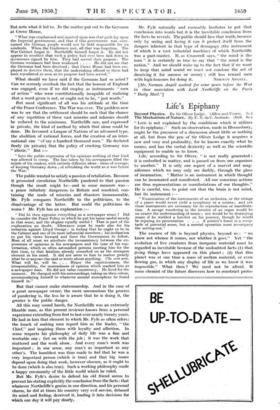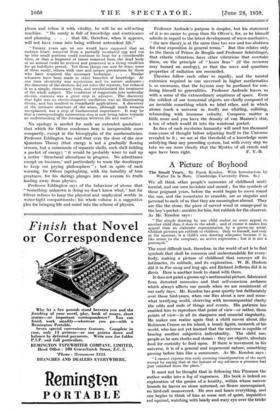Life's Epiphany
"LIFE is not explained by the conditions which it utilizes for its epiphany." Such an observation, made in Bloomsbury, might be the precursor of a discussion about little or nothing
at all, but from the pen of Sir Oliver Lodge it acquires a new and very real profundity, for he knows exactly what he means, and has the verbal dexterity as well as the scientific equipment to enable us to know.
Life, according to Sir Oliver, "is not really generated : it is embodied in matter, and is passed on from one organism to another." It is only one aspect of a marvel and mag- nificence which we may only see darkly, through the glass of incarnation. "Matter is an instrument in which thought can be incarnated and manifested. All our conscious actions are thus representations or manifestations of our thoughts." He is careful, too, to point out that the brain is not mind, but its instrument :—
"Examination of the instruments of an orchestra, or the strings of a piano would never yield a symphony or a sonata ; and yet those instruments are necessary for its reproduction or manifesta- tion. A savage wandering in the interior of an organ would be no nearer the understanding of music ; nor would he be destroying music if he wielded a hatchet on his journey, though he would be injuring its presentation . . . A printer's fount is a recep- tacle of potential sense, but a mental operation "must accompany the sorting-out."
The essence of life is beyond physics, beyond us : "we know not whence it comes, nor whither it goes." Yet "the evolution of live creatures from inorganic material must be regarded as inevitable because of the undoubted facts (1) that living things have appeared on this planet ; (2) that this planet was at one time a mass of molten material, or even flowing gas, in which any display of life as we know it was impossible." What then ? We need not be afraid. It some chemist of the future discovers how to construct prot,o- plasm and infuse it with vitality, he will be no self-acting machine. "He surely is full of knowledge and contrivance and planning . . . that life, therefore, when it appears, will not have come into being without antecedent life."
"Twenty years ago no one would have supposed that an embryo heart, removed from a partially incubated egg and cut up into small portions could continue to beat for a considerable time, or that a fragment of tissue removed from the dead body of an animal could be revived and preserved in a living condition for an indefinite period. Yet these things can now be done, some of them easily, others with care and proper precautions by those who have acquired the necessary technique. . . . Similar advances have been made in other branches of knowledge. At one time electricity was mysterious and its nature unknown ; the discovery of the electron did not solve the mystery, but reduced it to a simple, elementary form, and revolutionized the treatment of the whole subject. The resolution of magnetism into molecular electric currents was a great step in advance. The discovery that light was an electro-magnetic oscillation was an illuminating theory, and has resulted in remarkable applications. A discovery of the intimate structure of the atom, although much remains unexplained, was a step of fundamental importance. It may be that a correspondingly momentous step is now being taken towards an understanding of the interaction between life and matter."
No apology is needed for such an extended quotation : ' that which Sir Oliver condenses here is inexpressible more compactly, except in the hieroglyphs of the mathematician.
• Professor Eddington has said that over the door of the new Quantum Theory (that energy is not a gradually flowing " stream, but a cannonade of separate shells, each shell holding a packet of energy) "it would be probably wiser to nail up a notice 'Structural alterations in progress. No admittance except on business,' and particularly to warn the doorkeeper -to keep out prying philosophers " ; but in spite of such
• warning, Sir Oliver (apologizing, with the humility of true greatness, for his daring) plunges into an avenue to truth *lading away from physics.
Professor Eddington says of the behaviour of atoms that " Something unknown is doing we don't knbw what," but Sir Oliver refuses to keep the physical and unphysical worlds in ' water-tight compartments: his whole volume is a suggestive plea for bringing life and mind into the scheme of physics. ' Professor Andrade's purpose is simpler, but his statement of it is no easier to grasp than Sir Oliver's, for, as he himself admits in regard to the latest development of wave-mechanics, "the new theory isat the same time too raw and too abstruse for clear exposition in general terms." But this relates only to the thesis of Prince de Broglie and Professor Schrodinger, that etheric vibrations have other vibrations that overtak6 them, on the principle of "lesser fleas" (if the reviewer may hazard an analogy), so that the wave and quantum properties of radiation are reconciled.
Theories follow each other so rapidly, and the mental extension required in one unversed in higher mathematics Is so enormous, that the layman may be pardoned for cOn- fining himself to generalities. Professor Andrade leaves us with a sense of the extraordinary emptiness of space. Even . the solidest of our terrestrial objects are chiefly composed of an invisible something which we label ether, and in which atoms (each a universe in itself) are whirling, colliding, rebounding with immense velocity. Compress matter a little more and you have the density of van Maanen's star, a ton of which would fit into the waistcoat pocket.
In face of such mysteries humanity will need ten thousand man-years of thought before adjusting itself to the Universe revealed to it ; we are at the threshold of a knowledge more satisfying than any preceding system, but with every step we take we see more clearly that the Mystics of all creeds and



















































 Previous page
Previous page